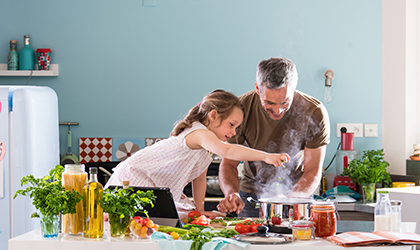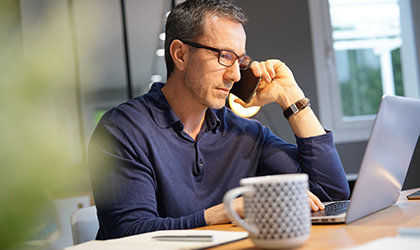
After a year of getting our heads around lockdown restrictions and living in a world where, at times, it felt positively apocalyptic (note the loo roll shortages, empty high streets, and cancelled Christmas plans), we now have to get to grips with returning to our ‘new’ old routines that once characterised the pre-Covid era.
And while some of us can’t wait to embrace our loved ones, jump back on crowded commuter trains (okay, perhaps a minority), or dive nose into a throng of sweaty party-goers at festivals, many of us – quite fairly – are feeling a little more anxious about readjusting to a post-lockdown world.
If you’re feeling overwhelmed at the thought of having to make a zillion social plans (remember those?), returning to work, or mixing with different households, please know that you’re not alone. And, rest assured, there are plenty of steps you can take to make this transitional period less intimidating.
Take it one step at a time
From overwhelmingly bustling streets to making small talk with your colleagues in the kitchen office, many things might spike your anxiety levels as you leave lockdown. A common response is to avoid these situations entirely, but this only serves to perpetuate the stress and fear.
One way to mitigate any unhelpful avoidance behaviour is by taking small steps to gradually ease yourself back into the rhythm of daily life. If you do happen to feel anxious before leaving the house and venturing out of your proverbial comfort zone, that’s okay. You could try calming yourself with mediation, a breathing practice, or reciting some positive affirmations.
Above all, don’t compare yourself to what others are doing. Be kind to yourself. Everyone deals with situations differently. And you’re allowed to leave lockdown at your own pace.
Practice socialising
We may feel a tad rusty and out of shape when it comes to the art of socialising. But who can blame us? It’s been an alien concept for almost a year now!
And yet, human touch, contact, and hugs – not just seeing pixelated faces on FaceTime or Zoom – are essential for our happiness. We need them to feel human.
Start socialising gradually: schedule in a few activities that you thoroughly enjoy with people you trust and make you feel good, and then slowly increase your commitments.
Avoid jam-packing your diary from the get-go. And remember to prioritise that all-important downtime, too.
Connect and communicate
One of the best things you can do at the moment is to connect and communicate with those around you. If you’re feeling worried about any aspect of emerging from lockdown, don’t bottle it up – talk about it.
You may, for instance, feel apprehensive about commuting to work or returning to the office. That’s okay – many people will be feeling the same. You may wish to have an informal chat with your boss or HR manager about the ways to make this transition easier for you. Remember, your employer has a duty of care to support your wellbeing.
Maintain a healthy lifestyle
Although the series of national lockdowns undoubtedly protected us from the threat of Covid-19, admittedly, they weren’t always great for our overall wellbeing. For many of us, regular exercise, nutritionally-dense meals, and connecting with our loved ones were replaced with alcohol, Netflix, and one too many takeaways, resulting in those infamous coronavirus kilos.
But, hey – life was stressful back then. We all needed comforting.
However, with lockdown behind us – and spring well and truly underway – it’s important to re-evaluate and prioritise our health again.
Make a conscious effort to move your body daily (why not venture back to your favourite workout class now that gyms have reopened?), eat well, get plenty of fresh air each day, sleep smart, and relax when needed.
These ingredients will be the key to supporting your mental and physical wellbeing as you return to ‘normal’ life once more.
Get immune-proof
With rendezvous-ing and mixing with others on the cards, it’s a good idea to consider your post-lockdown immune health. As with any fighting force, your immune system needs proper fuel and nutrition. The following nutrients may help to give your immune system an extra nudge as you move out of lockdown.
Vitamin D3
Also known as the ‘sunshine vitamin’, vitamin D3 is an important addition to your post-lockdown arsenal. Besides contributing to the normal function of the immune system, vitamin D also contributes to healthy inflammatory responses. Increasingly, low vitamin D levels are implicated in many health conditions. Find it in: Sardines and mushrooms.
Zinc
Involved in hundreds of processes in the body, zinc contributes to the normal skin function – a physical barrier against infection – and to the normal function of the immune system. Find it in: Lentils and pumpkin seeds.
Vitamin C
A powerful antioxidant, vitamin C contributes to the normal function of the immune system. Vitamin C is an essential vitamin, which means your body can’t produce it; you need to obtain it from your diet. Find it in: Spinach and Kiwi fruit.
Iron
Alongside supporting the reduction of tiredness and fatigue, iron contributes to the normal function of the immune system. Changes in your iron status can affect the body’s immune defences in different ways, and so it’s vital to ensure a regular and plentiful intake of this mineral. Find it in: Dried apricots and leafy green vegetables.
Think brain food
If you’re feeling fragile at the moment, don’t worry. To give your emotional health some additional TLC as we head out of lockdown, you may wish to consider the following nutrients.
St John’s Wort
Recognised by its yellow, star-shaped flowers, St John’s Wort is a traditional herbal remedy used for the relief of mild anxiety and slightly low mood.
Magnesium
Colloquially known as ‘nature’s tranquiliser’, magnesium contributes to normal psychological function, which may prove especially useful at the moment.
L-theanine
Most Brits are familiar with that ‘nice-cuppa-tea’ feeling. Well, it just so happens the amino acid, l-theanine, may be responsible for making the nation’s favourite brew oh-so-soothing.
Enjoy your taste of freedom – however you choose to spend it. And remember, go at your own pace.
Related Posts
Disclaimer: The information presented by Nature's Best is for informational purposes only. It is based on scientific studies (human, animal, or in vitro), clinical experience, or traditional usage as cited in each article. The results reported may not necessarily occur in all individuals. Self-treatment is not recommended for life-threatening conditions that require medical treatment under a doctor's care. For many of the conditions discussed, treatment with prescription or over the counter medication is also available. Consult your doctor, practitioner, and/or pharmacist for any health problem and before using any supplements or before making any changes in prescribed medications.

Olivia
Olivia Salter has always been an avid health nut. After graduating from the University of Bristol, she began working for a nutritional consultancy where she discovered her passion for all things wellness-related. There, she executed much of the company’s content marketing strategy and found her niche in health writing, publishing articles in Women’s Health, Mind Body Green, Thrive and Psychologies.
View More



